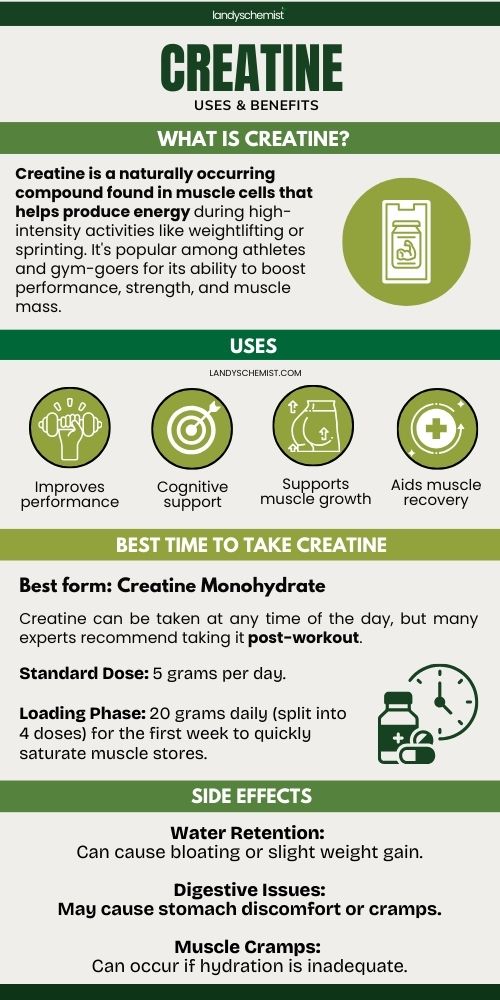
Can You Take Creatine Before Bed? Benefits, Timing, and Best Practices

Creatine is one of the most widely used and researched supplements in the fitness world, known for its ability to enhance performance, increase muscle mass, and improve overall strength. However, the question remains: can you take creatine before bed? The short answer is yes—you can take creatine at any time, including before sleep. But is this the most effective way to supplement creatine?
- Discover some of the best Creatine Supplements here.
- Creatine Gummies vs Powder: Which is most effective?
What Does Creatine Do?
Creatine is a naturally occurring compound found in muscle cells that helps produce energy during high-intensity activities, such as weightlifting or sprinting. "Creatine is stored in the muscles and helps generate ATP, the primary energy source during quick, explosive movements," explains Mitesh Desai, Head Nutritionist at Landys Chemist. Creatine's role in energy production is why it’s often favoured by athletes and gym-goers for improving performance and endurance.
However, creatine's benefits extend beyond the gym. Studies have shown that creatine may support cognitive function, reduce fatigue, and improve muscle recovery. Some research even suggests creatine might help individuals during periods of sleep deprivation, boosting energy levels and reducing the feeling of exhaustion.

Pros of Taking Creatine Before Bed
One of the primary concerns about taking supplements before bed is their potential to disrupt sleep. Fortunately, creatine is not a stimulant, meaning it won’t interfere with your sleep patterns. In fact, it can be taken at any time of the day to achieve results. Mitesh Desai points out, "The key with creatine is consistency. Whether you take it in the morning, after your workout, or before bed, the focus should be on making sure you take it daily to see the benefits."
1. Improved muscle recovery
Taking creatine before bed may be advantageous for muscle recovery. Sleep is the body’s natural recovery phase, and by having creatine in your system, you could potentially aid muscle repair and recovery while you sleep.
2. Convenience
For those with a busy schedule, taking creatine at night may simply be more convenient. As long as you're consistent with your intake, timing is less important than ensuring you don’t miss a dose.
3. Increased energy for the morning
Some research suggests that creatine can help reduce fatigue and support energy levels during periods of sleep deprivation. If you find yourself fatigued or lacking energy, creatine taken before bed could potentially boost your morning energy levels.
Cons of Taking Creatine Before Bed
While there are benefits, taking creatine before bed might not be the optimal strategy for everyone.
1. Potential missed opportunity for post-workout absorption
Taking creatine immediately after exercisemay yield better muscle gains, as your muscles are more receptive to nutrient uptake during this period.
2. Potential for digestive discomfort
Some individuals report mild digestive discomfort when taking creatine, especially in larger doses. If you take creatine before bed, any stomach discomfort could affect your sleep quality.
Read more: Does Creatine Make You Gain Weight?
Is It Better to Take Creatine During the Day or Before Bed?
The research behind the timing of creatine supplementation is mixed, with no clear answer. Creatine is commonly taken post-workout or 30 minutes before exercise, however, others find no significant difference in timing as long as daily intake is consistent.
Creatine Dosage
The typical dose of creatine is 5 grams per day, though some recommend a "loading phase" of 20 grams daily for the first week along with protein and carbohydrates to saturate muscle stores faster.
What is the Best Creatine to Take?
When it comes to creatine, there are various forms available, but creatine monohydrate is by far the most researched and widely recommended. Its effectiveness has been thoroughly backed by numerous studies, making it the gold standard for both performance and safety. While other forms, such as creatine ethyl ester or buffered creatine, claim to provide faster absorption or reduced bloating, these benefits are not consistently supported by scientific research.
Creatine monohydrate offers the best value for money and proven results, making it the go-to choice for most individuals looking to enhance muscle strength, endurance, and recovery. It's also highly versatile and suitable for both beginners and experienced athletes. If you’re new to creatine supplementation, starting with monohydrate is your safest and most effective option.
Taking Creatine Beyond the gym
While creatine is most commonly associated with athletes and gym-goers, its benefits extend beyond building muscle and enhancing physical performance. Creatine has been shown to support brain health, making it a potential supplement for cognitive function. Although much more research needs to be done to explore this connection. Some studies have indicated that creatine supplementation may improve memory and reasoning in tasks requiring high cognitive load.
Additionally, people experiencing chronic fatigue or those who are sleep-deprived may also benefit from creatine’s ability to boost energy levels.
Summary: So When Should You Take Creatine?
You can take creatine before bed as there is no evidence to suggest this would negatively impact results. Creatine is a versatile supplement that can be taken at any time of the day to build up muscle stores and provide performance benefits. Consistency is more important than timing when it comes to creatine supplementation.
For those who prefer taking creatine post-workout, this timing may be ideal for enhanced absorption. But if taking it before bed fits better with your schedule, rest assured that you're still reaping the benefits.









